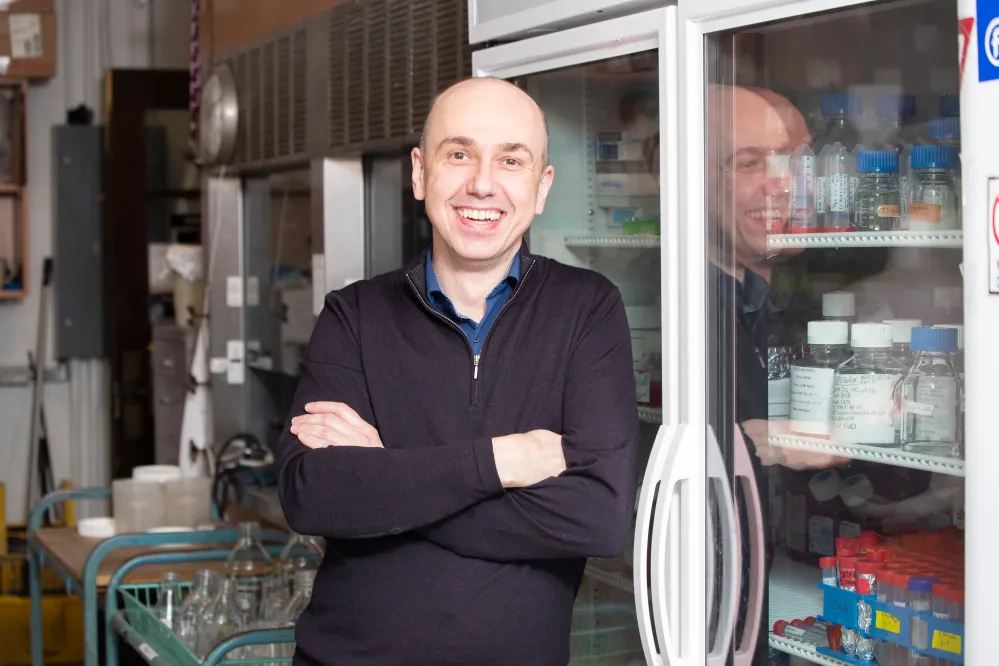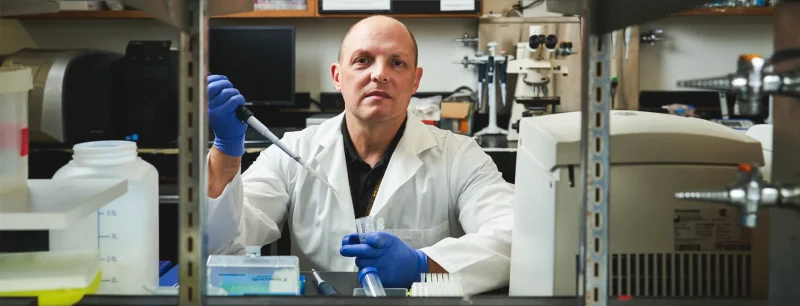
Dr. Peter Pelka, professor of microbiology
The Free Press: Saving lives with Manitoba-made vaccines
The Problem
When COVID-19 emerged in March 2020, Canada’s health-care system was confronted with a unique challenge.
As emergency rooms swelled with patients, there was intense pressure to come up with a vaccine to protect people and reduce the strain on hospitals.
Canada’s vaccine research and development capacity was lagging. “COVID-19 exposed the fact that we had no capacity to manufacture a vaccine in-house,” says Dr. Peter Pelka, a professor in the department of microbiology at the University of Manitoba. “It was immediately recognized [that]… we couldn’t prioritize our own citizens.”
Ultimately, the federal government purchased vaccines from manufacturers located outside of Canada. Without domestic capacity to quickly create vaccines, valuable time had been lost. Hospitals were overwhelmed, stretching resources and staff beyond their limits.
It was clear Canada needed to ramp up its capacity to produce its own vaccines.
The Solution
Fast forward to 2025, and scientists from across the Prairies have mobilized with a sole focus on being ready to produce vaccines when needed.
The project, led by Pelka, is a partnership between UM and the Universities of Alberta, Saskatchewan and Calgary to conduct world-leading vaccine and biomanufacturing research.
To enable that, the federal government made a historic $57-million investment, announced in May 2024, to build two innovative facilities at UM. These state-of-the-art labs – one on the Bannatyne campus and the other on the Fort Garry campus – will play a key role in addressing future pandemic threats in Canada and around the world.
“That will give us the platform we need for quick vaccine developments,” explains Pelka. “The goal would be to develop new viral vector vaccines quickly, hopefully in 100 days or less. Being part of this Prairie Hub will allow us to do research, and to manufacture vaccines in-house. The big thing is we will be able to develop vaccines quickly and safely.”
Not only that, but the next-generation vaccines produced at the UM labs will be delivered in a more effective manner.
“Unlike the older vaccines, new vaccines won’t require cold storage,” Pelka says. “They will be administered orally or nasally, with no needles required and at a much lower cost to manufacture. Our research is focused on exploring innovative technologies to produce safe and effective vaccines for diverse populations right here at home.”
The Impact
The major impact of the new research partnership and the facilities at UM will be that should another pandemic arise, response time will be greatly reduced, with the ability to create and produce made-in-Canada vaccines for Canadians who want them.
There will be economic benefits that come with the new facility as well, says Pelka.
“Construction will create jobs initially. Then, once the facilities are up and running, there will be lots of growth opportunities in Manitoba – new jobs in research and manufacturing, as well as training for the next generation of innovators.”
In essence, being a central part of viral research and vaccine development will add a new dimension to Manitoba’s health-care system and economy.

Dr. Jason Kindrachuk, associate professor of medical microbiology and infectious diseases
Dr. Jason Kindrachuk, UM Canada Research Chair in the molecular pathogenesis of emerging viruses, associate professor of medical microbiology and infectious diseases, researcher with the Children’s Hospital Research Institute of Manitoba and a lead member of the Prairie Hub, says the world-leading research and facilities will take vaccine development and delivery to a new level.
“These new, cutting-edge facilities will provide a unique opportunity for rapid identification of new emerging public health threats and inform the design and development of new therapeutics, diagnostics and vaccines to increase epidemic and pandemic preparedness and response in Manitoba,” says Kindrachuk.
“Beyond the scientific advances, the facilities will make Manitoba more competitive in attracting and retaining top research talent to study and work here.”
“Lessons have been learned,” Pelka says. “Research is going well. We’re entering an exciting time for the university and country. If another pandemic happens, we’ll be ready to make a vaccine quickly and stop it as soon as we can. And the university, along with its partners, will play a big role in making that happen.”
For nearly 150 years, the University of Manitoba has transformed lives through groundbreaking research and homegrown innovation. We push the boundaries of knowledge and do the hard work here in Manitoba to move our community and the world forward. Our researchers tackle society’s most pressing challenges, from health care and sustainability to Arctic accessibility and security, delivering solutions that make a real impact. With a spirit of determination and discovery, we are shaping a better future for our province and beyond.
Read The Free Press story here.
Research at the University of Manitoba is partially supported by funding from the Government of Canada Research Support Fund.






